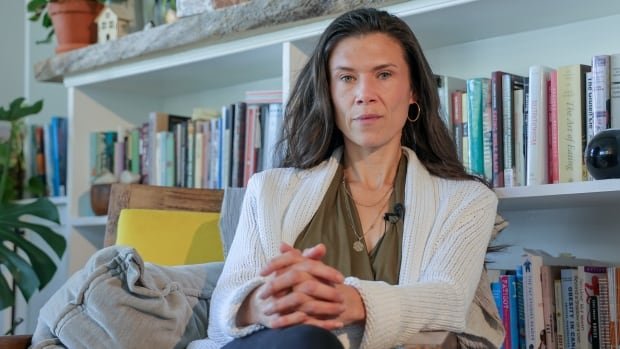As Jennifer Brady climbs into inflatable pants that cover from her toes to her chest, she positions her water bottle on the table beside her and starts pushing buttons on a machine.
The device, called a Lympha Press, is designed to move the fluid in her legs. She spends at least five hours a day tied to the machine, unable to do anything else — including caring for her two children, ages nine and 13. She also wears compression garments 24 hours a day.
This, combined with the fact she has been fighting the provincial Health Department in court for two years, has pushed the Halifax woman to the brink.
“I can’t go on living like this,” Brady said.
“My life revolves around managing my legs and experiencing pain every day and doing all this work to manage this disease and it continues to get worse and causes me tremendous pain every day.”
Brady, a dietitian and occasional columnist for CBC’s Information Morning Halifax, has lymphedema. It’s a disease that causes an accumulation of fluid and can result in painful swelling, increased risk of blood infection, cellulitis and hardening of the skin. In her case, it’s a side-effect from having her lymph nodes removed during a radical hysterectomy to treat cervical cancer.
In June, Brady applied for medical assistance in dying (MAID). Following intake, the MAID team brought her case to the attention of clinical lead Dr. Gord Gubitz, who then wrote a letter addressed to the special adviser to the Minister of Health and Wellness. Brady shared the letter with CBC.
“I have reviewed dozens of atypical MAID requests, but have never found myself in the position of writing a letter such as this,” wrote Gubitz on July 7.
“In my experience, people do not request MAID unless their life circumstances have become so dire that it is the only option. To request a MAID assessment is not an easy thing for most people; to do so when one is only 46 years old, otherwise healthy, and has two children at home is almost unthinkable.”
In the letter, Gubitz said Brady satisfies all federal criteria for medically assisted death except for one — that the medical condition underlying her request is irremediable. He said there are clear options for care that have been identified and should be explored.
“Your office can make this happen,” he wrote to the province’s health department.
The care Brady is seeking is surgery that is covered by Nova Scotia’s Medical Service Insurance (MSI), but no one in the province provides it and Nova Scotia has denied her request for out-of-province care.
She’s paid out-of-pocket for a consultation in Montreal and remortgaged her home to pay a surgery in Japan, but without MSI coverage, she said she cannot afford to get the ongoing care two doctors have said she needs to manage the condition that has made her life unbearable.

2 years of fighting in court
Brady’s battle for medical care is well-documented through an ongoing judicial review she filed in July 2022 in the Supreme Court of Nova Scotia to get reimbursement from the province for her medical care and better care options for people in her position. Final arguments were made in March and both parties are still waiting for a decision.
Brady said rather than admit mistakes, the Department of Health and Wellness has “doubled down on the errors and essentially dug its heels in.”
“I can’t even imagine what their lawyers’ fees will be at the end of the day to fight me and prevent me from getting treatment,” she said.
The Nova Scotia Department of Health and Wellness declined to comment on the case, saying it is currently in the court system.

According to the Canadian Lymphedema Framework, at least one million Canadians are impacted by lymphedema. Cancer-related lymphedema is the most common, affecting patients with breast, prostate, gynecological, melanoma, lymphoma and other cancers who have had lymph nodes or vessels removed or damaged during treatment.
Dr. Anna Towers, co-founder of the group, said lymphedema is a “lifelong condition” that can’t be fixed with medication. She said surgery also isn’t a cure, but it can relieve the symptoms for patients.
“The hope is that surgery will reduce the burden of the condition,’ said Towers.
History of care
Brady began experiencing swelling in her legs immediately following her radical hysterectomy in May 2019. Less than two months later, she was referred to the Lymphedema Clinic in Halifax where she was regularly measured for compression garments. But other than getting manual lymphatic drainage from a massage therapist, she said further treatment wasn’t available in Nova Scotia, so she began to research treatment options elsewhere.
In June 2021, she had a consultation with Dr. Joshua Vorstenbosch, a specialist in the surgical lymphedema program at McGill University Health Centre in Montreal. He recommended two surgery options for Brady and wrote her a referral, in addition to a previous referral from her nurse practitioner, so she could apply for out-of-province care through the MSI programs.
Brady was denied approval, and subsequently denied an appeal, on the grounds she was not pre-approved to go to Montreal and did not have a referral from a Nova Scotia specialist.

Dr. James Bentley, the surgeon who did her hysterectomy and continued to follow her post-cancer, later wrote another referral to the MSI department in May 2022.
“After seeing the patient yesterday and noting her significant swelling despite double pressure stockings, I would strongly support and advocate that MSI provide some help for her previous appointments and upcoming potential surgery,” wrote Bentley.
He specifically referenced the procedure she ended up getting — lymphovenous anastomosis — along with a lymph node transplant as possible surgery options.
Further email correspondence filed in court shows there isn’t a single Nova Scotia physician who specializes in lymphedema, which often falls under plastic surgery. In November 2022, Dr. Jason Williams, a Halifax plastic surgeon said in an email to Bentley, “we in plastic surgery don’t see or treat lymphedema or lipedema currently.”
Williams also confirmed in the same email that “surgeries are not offered in N.S.”
Out-of-country care
Despite being advised by an MSI manager to “wait until prior approval is in place to making further arrangements for travel outside of the province,” Brady went to Japan in June 2022 where she had lymphovenous anastomosis, also known as LVA surgery. She remortgaged her house to pay for the procedure and travel costs totalling $60,000. As part of her judicial review, she is seeking reimbursement for that trip as well.
The surgery is on the list of Nova Scotia’s insured services.
She said she initially tried to get surgery in Canada, including with Vorstenbosch at the Royal Victoria Hospital in Montreal, but the hospital wasn’t accepting out-of-province patients.
Vorstenbosch confirms that’s still the case.
“There’s only a handful of centres across the country that are offering lymphatic surgery, and from the colleagues I’m speaking to from across the country it’s a pretty similar situation,” he said.
“The waitlists are so long for patients within their own city or province or health network that it really is a challenge to offer these services to patients from provinces where it’s not necessarily available.”

Brady said the LVA surgery in Japan helped her right leg immensely. But since the procedure two years ago, her left leg has deteriorated and she has since been in hospital with several blood infections.
This month, she once again applied for a second round of LVA surgery out-of-province. She’s willing to go anywhere treatment is available.
But she’s not holding her breath.
“One of the things that I have found really difficult through this whole process is holding out enough hope to keep going on one side, but not so much hope that you’re crushed every single time you get more runaround or an unsupportive decision or another barrier to accessing care,” Brady said.
Policy quietly changed
In the midst of Brady’s furious quest for medical care, Nova Scotia’s Hospital Insurance Regulations Act was amended in February 2023 to allow “a physician who holds a relevant specialty approved by the minister and who has treated the resident” to provide a referral. That would mean that with the minister’s discretion, one of her previous clinicians could now make the referral.
Barbarie Palmer with the Department of Health and Wellness confirmed the change in court on March 25, 2024.
“The new legislative change references the fact that a minister’s discretion, the nature of the specialist could be different,” said Palmer.
However, when CBC requested further comment from the department, it denied the change.
“MSI still requires a Nova Scotian specialist to make a referral to MSI for publicly funded out-out-province services. This policy has not changed,” said spokesperson Amanda Silliker in an emailed statement.
When pressed on the discrepancy with court testimony, she said: “We cannot comment any further on matters related to cases that are currently in the court system.”
Life and death
Brady’s lawyer said the consequences for Nova Scotia patients are “life and death.”
“Saying no to treatment and surgeries … has very high stakes and very real life consequences to people like Ms. Brady who can’t wait forever to obtain the medically required treatment that they need to lead their lives,” said Richard Norman.
Brady said she realizes people may not understand why she’s considering ending her life. Diagnosed with severe depression, she said she has been prescribed five different medications. However, they all caused swelling and exacerbated her condition.
“I essentially have untreated depression that, you know, as it does for anybody, hugely impacts your day-to-day, desire to live even,” she said. “It’s not much of a life when everything that you enjoy has been taken away from you because of a disease.”


